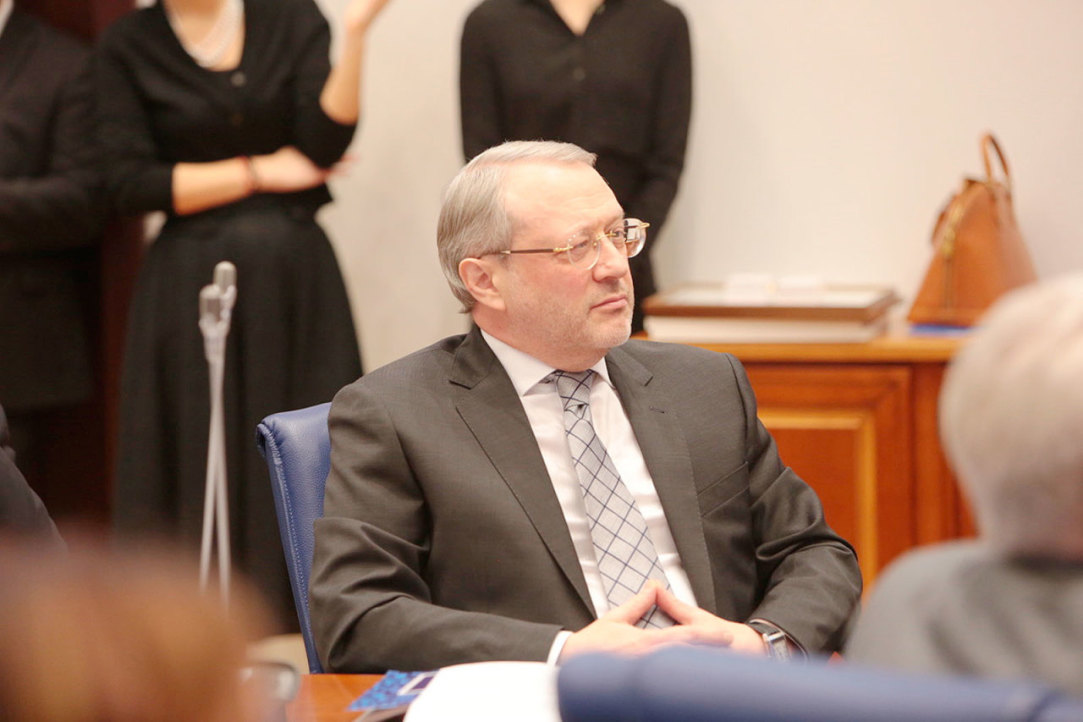Living in an Age of Change: Understanding Digital Exclusion

The competition for promising young researchers is intensifying around the world, and spending on preparing future generations of highly qualified specialists is on the rise. This is happening against a backdrop of digitalisation, which is creating a new digital inequality. For example, a quarter of the adult population in Russia does not possess any digital skills and does not use the Internet. These and other topics were discussed by participants of a round table held during the XXII April International Academic Conference on Economic and Social Development organised by HSE University and Sberbank.
A special round table discussion on ‘Man in the Era of Technology Transformation’ was held by the Institute for Statistical Studies and Economics of Knowledge (ISSEK) at HSE University as part of the Foresight and Science, Technology and Innovation Policy Symposium, associated with the April Conference. The discussion focused on the first results of a series of projects implemented by ISSEK together with other participants of the Human Capital Multidisciplinary Research Center.
Leonid Gokhberg, First Vice Rector of HSE University and moderator of the discussion, mentioned the history of establishing world-class research centres in priority areas of scientific and technological development as part of Russia’s National Project for Science. Last year, a consortium coordinated by HSE University in partnership with The Russian Presidential Academy of National Economy and Public Administration (RANEPA), Moscow State Institute of International Relations (MGIMO), and the RAS Institute of Ethnology and Anthropology, won a competition on the theme of Human, Society and Nature Research with a request to create the Centre for Interdisciplinary Human Development Research. At present, the already established Centre, as the First Vice Rector noted, has become ‘not just the only, but also the largest research project in the field of socio-humanities in Russia.’

One of the Centre's seven major areas of research and teaching is devoted to a comprehensive study of the effects of technological transformation on human life, its values, competencies, and the labour market. Leading researchers from ISSEK, who coordinate projects in this area within the research centre, presented the first results and outlined plans for some of the work up until 2025.
The round table was attended by Konstantin Vishnevskiy, Director of the Digital Economics Centre; Yulia Milshina, Senior Research Fellow, International Research and Educational Foresight Centre; Ekaterina Streltsova, Deputy Director of the Centre for Statistics and Monitoring of S&T and Innovation; Vitaliy Roud, Deputy Head of the Laboratory for Economics of Innovation; and Natalia Shmatko, Head of the Department for Human Capital Research. Their presentations may be viewed in full in the video recording of the round table.
The participants discussed the fact that, on average, everyone on Earth spends about 6.5 hours online per day, or 40% of their waking hours. However, some social groups are more successful in the digital environment due to age, skill sets, or other factors, while others are at risk of digital exclusion.
In Russia, a quarter of the adult population lack digital skills and do not use the Internet. About 40% of Russians have only basic digital skills, which are not sufficient to immerse themselves fully in the digital environment, the ISSEK experts noted.
The digital gap is becoming a new driver of social inequality and discrimination
There is now a societal demand for expert monitoring of ‘digital exclusion’. The issue of defining new privacy and conflict with technology requires separate, in-depth study. The boundaries of the real and digital worlds are blurring, and the perception of private (personal) and public is changing dramatically in the digital environment (e.g., a person's phone contact data is no longer always private).
According to the round table participants, new technologies are changing the formats of production, the dissemination of knowledge, and the emergence of new products on this basis. The tradition of researching innovations from the perspective of measuring the producer's ‘Schumpeterian rent’ (income earned in the period between the introduction of an innovation and its wider dissemination) has in recent years been supplemented by an increasingly active study of user innovations. Some useful solutions are also created by users themselves for their own needs, such as sports or even scientific equipment.
The XXII April International Academic Conference on Economics and Social Development will be held from April 13 to 30, 2021. For the first time, the conference is co-organized by HSE University and Sberbank. The programme includes a series of academic and expert discussions that will be held as part of the HSE-Sberbank Discussion Club – an expert platform that brings together academics, business representatives, and public officials to discuss critical economic and social challenges and share best practices in the sphere of business and institutional development, thereby laying out a path to the future.
As shown by ISSEK monitoring data, in 2018 3.8% of the adult population in Russia were involved in creating user innovations.
Empirical studies of new aspects relating to the internal and external openness of organisations in building knowledge flows, as well as the willingness of employees and users to participate in these flows, will form a large block of the Centre’s work as part of a unified approach to the study of innovative culture at the organisational and social levels. As Leonid Gokhberg pointed out, there is very little research touching on the transition from analysing the innovation capacity of organisations to studying the innovation capacity of employees within organisations.
Human-centred technology and its relationship to improving everyone's quality of life is an important trend not only in foreign research, but also in certain leading management practices
Thus, increasing the role of the consumer and buyer in the innovation ecosystem is among the important principles of Japan's strategy for human capital development, Society 5.0 (SuperSmartSociety), about which Kuniko Urashima from NISTEP spoke in more detail at the second session of the Foresight and Science, Technology and Innovation Policy Symposium.
The acceleration of innovative development is closely linked to an increase in the number of highly qualified people engaged in research and development.
In leading countries, the number of highly qualified personnel has been growing steadily, while in Russia it has declined by an average of 1.5% annually between 2000 and 2018.
There is also a growing global demand for scientific talent in new industries, such as the service industry, and for research skills in non-science sectors — business, government, and other areas. International competition for emerging and leading researchers is intensifying and many countries are increasing spending on training, strengthening postgraduate institutions, and trying to close the skills gap by attracting talent from abroad.
Such a situation is risky for Russia, ISSEK specialists believe, since the outflow of qualified personnel and highly cited scholars from the country is higher than the inflow of specialists. There is an urgent need to improve the attractiveness of careers in research: it is important to study and adapt the best domestic and foreign practices in order to offer talented scholars and researchers decent career opportunities.
Source: HSE University official website
